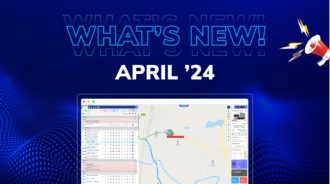In today’s fast-paced world, the efficiency of logistics and fleet management has become paramount, especially in specialized sectors like waste management. Among the various technological advancements, fleet monitoring solutions have emerged as a game-changer. These solutions, often embodied in sophisticated fleet monitoring software, provide unprecedented control and oversight over fleet operations. But the question many business leaders and managers ask is: Are these solutions truly worth the investment?
In this comprehensive guide, we’ll dive deep into the world of fleet monitoring, connecting it specifically to the advanced waste collection software that’s revolutionizing the industry.
Understanding Fleet Monitoring Solutions
Fleet monitoring solutions have revolutionized how companies manage and operate their vehicle fleets. But what exactly are these solutions, and how have they evolved over time?
What are Fleet Monitoring Solutions?
At its core, a fleet monitoring solution is a system that uses technology to track and manage fleet vehicles. This technology often involves GPS tracking, real-time data analysis, and sophisticated software interfaces. The primary goal is to enhance the visibility, control, and efficiency of fleet operations, which is crucial in sectors like waste management where timing and precision play a significant role.
The Evolution of Fleet Monitoring
Fleet monitoring has come a long way from its early days of basic GPS tracking. Advances in technology have led to the integration of features like route optimization, vehicle diagnostics, driver behavior analysis, and predictive maintenance. This evolution has been driven by the need for greater efficiency, cost reduction, and enhanced service delivery.
Modern Fleet Monitoring Software Features
Today’s fleet monitoring software is a far cry from its predecessors.
- Real-time GPS Tracking: Allows for live monitoring of vehicle locations and routes.
- Data Analytics: Provides insights into fleet performance and areas for improvement.
- Route Optimization: Ensures the most efficient routes are taken, saving time and fuel.
- Vehicle Health Monitoring: Alerts managers about maintenance needs.
- Driver Performance Tracking: Monitors driving patterns to ensure safety and efficiency.
These features not only improve the operational aspects of a fleet but also contribute significantly to the overall strategic planning and decision-making process in waste management operations.
The Importance of Fleet Monitoring in Waste Management
In the context of waste management, fleet monitoring solutions are not just a luxury but a necessity. The efficient handling and transportation of waste require precise coordination and management, which is where fleet monitoring plays a pivotal role.
Enhancing Operational Efficiency
One of the primary benefits of implementing fleet monitoring solutions in waste management is the significant boost in operational efficiency. With real-time tracking and route optimization, waste collection vehicles can navigate through cities and neighborhoods in the most efficient manner. This reduces fuel consumption, minimizes delays, and ensures timely collection and disposal of waste.
Cost Reduction and Service Improvement
Another key advantage is the ability to cut costs while simultaneously improving service quality. Fleet monitoring software helps in identifying the most cost-effective routes and schedules, leading to reduced operational costs. Moreover, by ensuring timely waste collection, these solutions help in maintaining a higher standard of service, which is crucial for customer satisfaction and retention.
Integration with Advanced Waste Collection Software
Fleet monitoring solutions can seamlessly integrate with advanced waste collection software. This integration provides a comprehensive overview of the entire waste management process, from collection to disposal. It enables better planning, informed decision-making, and a more responsive service model, which is particularly important in the dynamic field of waste management.
The role of fleet monitoring in waste management cannot be overstated. It’s a critical tool that not only streamlines operations but also plays a key role in strategy formulation and customer service enhancement.
Key Trends in Fleet Monitoring Solutions
The fleet monitoring landscape is constantly evolving, driven by technological advancements and changing industry needs. Understanding these trends is crucial for businesses looking to stay ahead in the competitive field of waste management.
Advanced Data Analytics and AI
One of the most significant trends is the integration of advanced data analytics and artificial intelligence (AI) in fleet monitoring software. These technologies provide deeper insights into fleet operations, enabling predictive maintenance, route optimization, and even automated decision-making processes. AI-driven analytics can anticipate potential issues and suggest solutions, leading to proactive rather than reactive management.
Increased Focus on Sustainability
Sustainability is another key trend shaping the future of fleet monitoring. With growing environmental concerns, there’s a push towards eco-friendly practices in fleet management. Modern fleet monitoring solutions help in reducing carbon footprints by optimizing routes, decreasing idle times, and promoting fuel-efficient driving behaviors.
IoT and Connected Devices
The Internet of Things (IoT) has brought a new dimension to fleet monitoring. IoT-enabled devices provide real-time data on various aspects of fleet management, from vehicle health to environmental conditions. This interconnectedness results in more comprehensive monitoring and management capabilities, essential for modern waste management operations.
Mobile Technology and Accessibility
The rise of mobile technology has made fleet monitoring more accessible. Managers and operators can now track and manage their fleets from anywhere, using smartphones and tablets. This mobility enhances responsiveness and allows for real-time adjustments, crucial in dynamic waste management scenarios.
Integration with Other Systems
Finally, the trend towards integration with other business systems is becoming increasingly important. Fleet monitoring solutions are no longer standalone systems; they are part of a larger ecosystem that includes advanced waste collection software, customer relationship management systems, and financial management tools. This integration leads to a more cohesive and efficient operation.
These trends not only reflect the current state of fleet monitoring solutions but also provide a glimpse into the future, highlighting the continuous innovation and improvement in the field.
Cost-Benefit Analysis of Fleet Monitoring Solutions
Investing in fleet monitoring solutions is a significant decision for any business. Understanding the cost versus the benefits is crucial for making an informed choice, especially in the waste management sector.
Initial Investment and Operational Costs
The initial investment in fleet monitoring software varies depending on the scale of operations and the specific features required. Costs may include hardware installation (like GPS devices), software subscription fees, and training expenses. Additionally, ongoing operational costs such as software updates and maintenance must be considered.
Return on Investment (ROI)
Despite the initial outlay, the ROI of fleet monitoring solutions can be substantial. Businesses often observe a decrease in fuel costs due to optimized routing, reduced idle time, and efficient driving practices. Improved vehicle maintenance practices, informed by fleet monitoring, can extend the life of vehicles, saving on replacement or repair costs.
Case Studies and Real-World Examples
Real-world examples further illuminate the benefits. Companies in the waste management industry have reported significant reductions in operational costs and enhanced customer satisfaction after implementing fleet monitoring systems. Case studies often show a reduction in fuel usage by a notable percentage and improved route efficiency, leading to more waste collection in less time.
Long-Term Financial Benefits
In the long term, the financial benefits of adopting fleet monitoring solutions go beyond just cost savings. Enhanced service quality leads to better customer retention and potentially more business opportunities. The data gathered from fleet monitoring can also inform strategic decisions, leading to more efficient and profitable business models.
Fleet monitoring solutions, therefore, offer a compelling value proposition. While the initial investment might be considerable, the long-term benefits in cost savings, improved efficiency, and enhanced service quality make it a worthwhile investment for businesses in waste management.
Challenges and Considerations
While fleet monitoring solutions offer significant benefits, there are challenges and considerations that businesses must navigate to ensure successful implementation and operation, especially in the waste management sector.
Implementation Challenges
One of the primary challenges is the initial implementation. This can include the technical aspects of installing hardware and software, as well as the organizational change required to integrate these systems into existing operations. Employee training and acceptance are crucial, as resistance to new technologies can hinder effectiveness.
Data Privacy and Security
With the increasing reliance on digital solutions, data privacy and security become paramount. Fleet monitoring systems handle a large amount of sensitive data, and ensuring its security against breaches is essential. Compliance with data protection regulations is also a critical consideration.
System Integration and Compatibility
Integrating fleet monitoring solutions with existing systems, such as advanced waste collection software, can be complex. Compatibility issues may arise, requiring additional resources for customization or upgrades. Seamless integration is key to leveraging the full benefits of fleet monitoring.
Keeping Up with Technological Advancements
The rapid pace of technological advancement means that fleet monitoring solutions can quickly become outdated. Businesses must stay informed about new trends and updates to ensure their systems remain effective and competitive. This may involve additional investments in software upgrades or new hardware over time.
Balancing Cost and Quality
Finally, balancing the cost of these solutions with the quality of service they provide is a delicate act. Opting for cheaper options might save money initially but could lead to inefficiencies or increased costs in the long run. Conversely, the most expensive solutions may offer features that are superfluous for the business’s specific needs.
Navigating these challenges requires careful planning, a clear understanding of the business’s specific requirements, and a commitment to ongoing management and adaptation of the fleet monitoring system.
Conclusion
In conclusion, fleet monitoring solutions, particularly in the context of waste management, are more than just a technological upgrade; they are a strategic investment. The benefits of enhanced efficiency, cost savings, and improved customer service are clear and demonstrable. While the initial investment and ongoing maintenance require careful consideration, the long-term advantages and ROI make these solutions a valuable asset.
It’s important to stay informed about the latest trends in fleet monitoring and to choose a solution that aligns with your business needs and integrates smoothly with other key systems, like advanced waste collection software. The challenges of implementation, data security, and keeping up with technological advancements are real, but with the right approach and support, they can be effectively managed.
If you’re looking to elevate your waste management operations, exploring fleet monitoring solutions is a step in the right direction. Evaluate your options, consider the long-term benefits, and invest in a solution that will bring your fleet management into the future.



